Tour de Trans: A Q&A for International Non-Binary Day

As they prepare to cycle across Britain raising awareness and money for charity, Paeton and Callum McGuire explain why the ‘Tour de Trans’ is so important…
By Zoe Vicarage

Paeton and Callum McGuire are preparing to embark on an epic cycling adventure – and to mark International Non-Binary Day on July 14, they’re here to bring us up to speed!
On August 13, the intrepid duo will set off on the ‘Tour de Trans’, a 1,000-mile bike ride from Land’s End to John o’ Groats that will help to raise awareness around trans and non-binary inclusion in the UK as well as raise money for the Southampton-based charity Chrysalis GIM – ‘Gender Identity Matters’, which was founded back in 2004.
Paeton is non-binary trans and a few weeks before the pandemic hit, they began their transition, informing friends, family, and crucially, Chrysalis. Lockdown made this process even more challenging than it might otherwise be, but the services provided by the charity to help Paeton and others across southern Britain continued online.

“At a time when I needed a level of support, love and understanding that those around me simply couldn’t give, the world as we knew it contracted and changed so radically and quickly, that I was suddenly left feeling isolated, vulnerable and desperate,” wrote Paeton in their fundraiser blog.
“Selflessly, the Chrysalis team, themselves experiencing high levels of anxiety, uncertainty and fear as a result of what was happening around us, nonetheless gave tirelessly of their time and selves. They moved heaven and earth to ensure that the services Chrysalis provides could continue despite the massive disruption of these unprecedented times.
“I want to pay the selfless, tireless generosity of the Chrysalis family forward, so am cycling 1,000 miles the length of Great Britain in August 2020, raising money to support their vital, even life-saving work.”
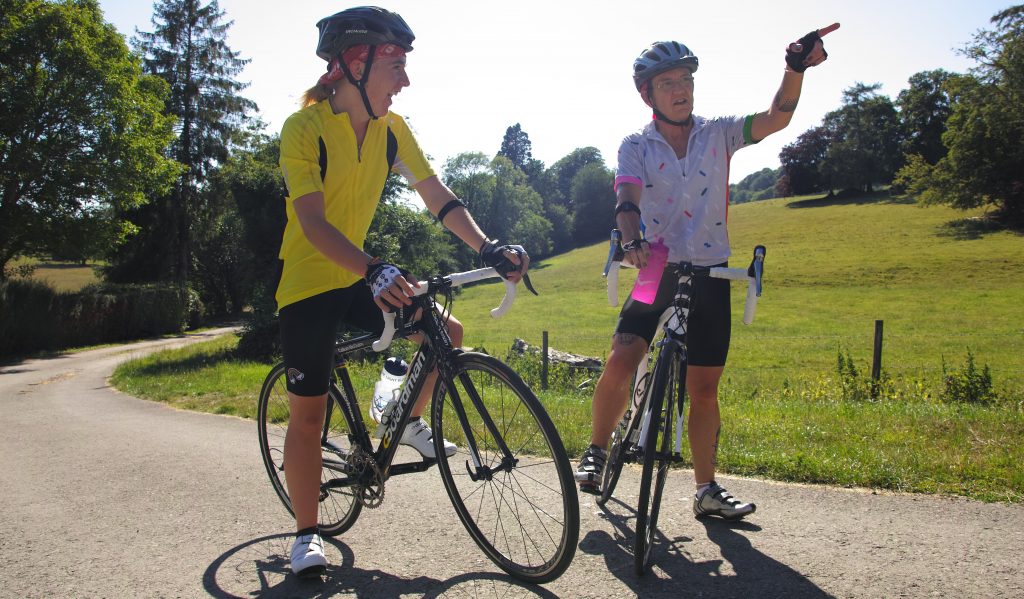
Zoe Vicarage – a keen cyclist herself – caught up with Paeton and Callum to learn more about Paeton’s personal journey thus far, the origins of the ‘Tour de Trans’, and what they hope to achieve when they hit the road in August…
How did the idea for Tour de Trans come about?
Paeton: Cycling has always been a part of my life but I only started my transition in February of this year. As part of this process, I had to re-examine everything about the person I had been up until now. Cycling was one of the big things – I needed to understand whether it was part of me, or whether it was part of the person I’ve been trying to be for the past 53 years. When I realised it was very much a part of who I am, I re-engaged as I haven’t cycled properly since 2014.
When we went into lockdown, I started to get back onto the turbo trainer and exercise. One day during a session, I was going through this process of accepting and understanding how important cycling is to me personally and always will be. I decided that I was going to do this ride from Land’s End to John o’ Groats which I’ve been speaking about for years but never had the conviction to actually do.
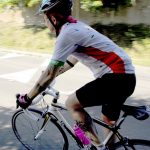
That’s when the name ‘Tour de Trans’ popped into my head as a part of the celebration of my journey to wholeness and completion. When I gave it a little bit more thought, it had the potential to be something bigger and to have even more meaning than me just doing a bike ride to celebrate my personal journey. Considering the need for more transgender awareness across all levels of society, I thought it would be great to do this like a national tour and join up with other organisations like Chrysalis to create a more unified voice and presence across the country. As the tour travels the length of Britain, we could use it together with other organisations as a way to raise awareness in local areas. That’s really where the Tour de Trans concept was born.
I went to Andy Maratos, CEO of Chrysalis, with the idea and they were very excited. They said tell us more and that’s where it started. It was initially meant to be a personal journey but I wanted to ‘pay it forward’ as I have benefitted personally from the support Chrysalis gives. That’s how the Tour de Trans grew into the fundraising and national awareness event it is today.
I’ve seen a lot about the Tour de Trans being an inclusive project. Is that something that’s been important to you?
Paeton: Absolutely. The whole raison d’etre behind it is to send a positive message about being trans and to say in general that we are normal people, not freaks or monsters. ‘Look, we can also ride bikes and be fit and healthy just like anyone else!’ I also wanted it to be very inclusive so it’s not just about being trans, or that only trans people are able to take part and be supported. I wanted to send a very clear message of openness and acceptance of inclusivity for all.
In recent weeks, there has been a lot of talk about trans issues, with some negative coverage. Do you feel that the timing of Tour de Trans is more important than ever?
Paeton: The whole concept was born before this recent upsurge in commentary in the press and as this developed, I sat on the sidelines watching this and saw something every day that made this tour more important and relevant. What has been happening recently makes the message of this tour something that needs to be heard and shared even more.
The other reason I wanted to do it now, and this has been part of the challenge, is the current situation we are in. When we started planning this tour, we had no idea whether it would be able to go ahead or not because of the circumstances. We’ve had to go back to the drawing board as we slowly get back to the new normal. We have had to re-jig and re-design the tour in line with that because initially we thought we would have to be very small. We were just hoping we were able to do the tour even if it meant sleeping in car parks. The Tour has evolved and grown organically, gaining a sense of importance, life and validity of its own.
How challenging has it been to adapt the route and get people involved, with the various changes in government guidance?
Paeton: Initially it was designed that it was going to be completely self-contained. We were hoping we would be where we are now but we weren’t sure. How the mechanics of the tour are going to work are that my partner and I have bought a caravan so my partner will be following us. My son, Callum, will be riding the tour with me and we will be staying and sleeping overnight in the caravan. We will be self-sufficient and if needs be, we won’t need to utilise external resources.
When it comes to the social outreach aspect and when I conceptualised the tagline for the tour – ‘Across genders, across Britain’ – we really want that to be a real aspect of the tour. We are organising four awareness events along the way which will consist of two elements – the first being a ‘pRide Along’, which is an opportunity for people to bring along their bicycles and ride with us for a short easy, fun ceremonial ride wherever this is taking place to create a sense of visibility and unity.
Our first one is in Totnes on August 14 and that is with an organisation called Proud2Be. Our second one is our main Chrysalis event on August 16 in Southampton, one in Manchester on the 19th and another in Edinburgh three days later on Saturday the 22nd. These events we’ve almost had to leave until the last minute as we were unsure if we’d be able to have any kind of gathering and if so, what it would look like. It’s been designed in a way that even if we had strict social distancing measures, they would have been able to have gone ahead as they were outdoor and size-limited. They have been designed to be modular and adaptable with the changing situation.
You must be delighted the events are going to happen?
Paeton: We’re very happy. It was quite touch and go. As the situation unfolded and things relaxed, we were more encouraged. A lot of people have asked, why go ahead now and why not wait until next year? There are two very good reasons; when lockdown happened, the people that Chrysalis provide support to were suddenly deprived of their self-care strategy which is peer support groups, contact with other transgender people, counsellors and facilitators. It took a big toll on Chrysalis members, and me personally, being deprived of this contact, the ability to sit down and socialise and share with other people going through similar experiences. We wanted something to give people to look forward to – life beyond lockdown as it were. That’s one of the reasons why, even though it is quite challenging to do it in these circumstances, I was quite determined to give Chrysalis and the people involved something to look forward to and work towards at a time when it was a little bit bleak and there was no light at the end of the tunnel.
How important are Chrysalis and how important have they been to you on your personal journey?
Paeton: Very. Chrysalis provides support to at any one given time approximately 120 people going through transition at various stages. Some people are questioning, some are quite far down and well into their journey. This is a journey that can take years for a person to go through and get to an end point where they are able to live a harmonious, balanced and fully integrated life as themselves. The support Chrysalis gives through that process has been valuable to me personally and I see the benefit of it in other people. There is a reason why trans individuals, particularly going through the transition process, are at a high risk of suicide. At a time when a person is going through an incredibly challenging and demanding area of self-evaluation and undoing every part of their own identity to reknit it together and discover who they really are, they are also often very isolated, both from their own support structures, and society in general. The level of support Chrysalis provides is invaluable.
I personally am 53 and I have struggled with gender incongruence my whole life but when I left university and entered the corporate world, that was the last time I was able to display any outward signs of my true self because of transphobia and at that time, homophobia. I’ve suffered fairly severe transphobic and homophobic abuse – I’ve been spat at, hit, kicked, and even urinated on. I got to a point where I decided it was really not worth it and I locked it all away. That box that was locked away only got opened at the beginning of this year at a time when as we know it, the world was collapsing in on itself. If it were not for Chrysalis and being able to reach out to them at that time, I don’t know where I would be today.
They had to rethink their whole model and start delivering their support on video conferences, by phone and email to check up on individuals to keep that contact alive. They’ve played a very important role to me personally but they also provide support to partners, parents. Their approach is no one individual operates in a vacuum and although I’m transgender and going through it, it doesn’t just affect me – it affects my partner, my children and my friends. Chrysalis’ objective is to minimise the fallout so that people can go through this process and come out the other end as happy, healthy and productive members of society. That is something I really want to support and that’s why the fundraising element of Tour de Trans is so important.
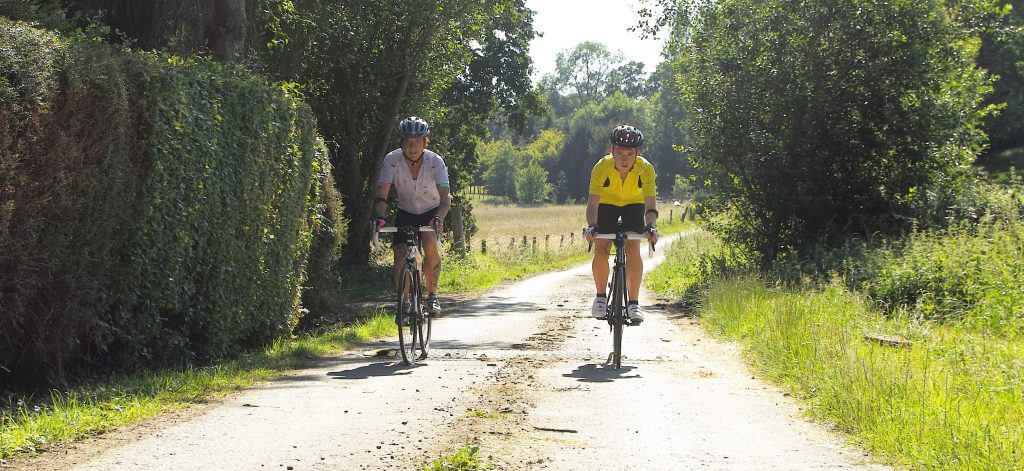
A thousand miles is not an easy task – how have training preparations gone?
Paeton: It is part of my challenge as I also battle with depression as well as struggling with gender dysphoria. I’ve had to overcome the demands of resolving gender dysphoria and working around at times debilitating depression. As an example, I lost a week’s worth of training because of depression as it gets to a point where I don’t have the mental strength and energy to get on my bike to push myself. Aside from that, the training has been going well. I am actually a British Cycling coach so that has certainly helped and I have cycled since 1990. All of that knowledge and experience has gone into the training. It has been a combination of indoor training sessions which have been very gruelling and targeted. We’re now starting to get on the road to do more distance and time on there. I wish I could say it’s going really, really well but it’s going and we will prevail.
We’ve had challenges and setbacks as part of this process. My bike broke four weeks after we decided to do it and with the situation we were in because of coronavirus, getting spare parts was incredibly difficult. Life and the universe has opened doors and provided and we’re now in a situation where I have a new bike. Callum now has my bike that broke that has been fully repaired and that’s his dream bike which he’s always wanted.
We’re looking at 80 miles a day for 13 days which will equate to around five to eight hours on the bike depending on the route. We also decided to swing past Southampton instead of heading north out of Land’s End so we could attend and be part of the awareness event there. It has added 100+ miles to the route but it will be worth it.
Callum, you must be looking forward to taking part in this and supporting Paeton along the way?

Callum: I’ve always wanted to do this ride. It’s always been on my radar and I’ve never really had the time. It’s going to be fun and I’m sure it’s going to be me dragging Maddy up the hills and supporting them. When they asked if I’d be interested in riding with, my first thought was ‘mad’, but then I gave it some more thought, and when I told them I was up for it, they were quite taken aback.
Paeton: Callum is 17 and I am 53. I did say there was going to be a time when I said he was going to be able to ride my legs off and it seems that time has come. I do still have the benefit of age, wisdom and endurance though, so we’ll see who’s dragging whom up the hill…
Callum: One of the things I’m most excited about is the events and to be part of something. I don’t mind if it’s two or three riders coming down and riding for five minutes. It’s going to be a very good day when we get to John o’ Groats and we run out of road to cycle.
Having John o’ Groats as the final target must spur you on greatly?
Callum: What will help spur me on is that both of us have Scottish heritage which adds a sense patriotism to the Tour. There’s also the fact that Britain is such a beautiful country and I have seen pictures of roads in Scotland, which I hope we will be cycling down, that are absolutely breathtaking. Just knowing that you are going to be surrounded by nature and in the middle of nowhere with just yourself, the bike and the road is a huge spur. To do it for a cause like Chrysalis just adds that sense of accomplishment.
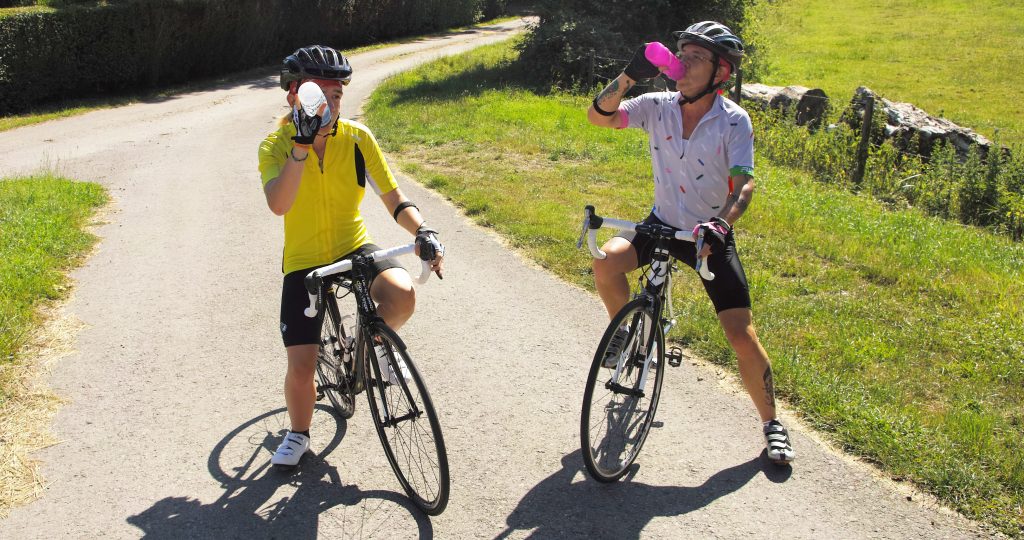
Paeton, July 14 is International Non-Binary Day. What are your experiences of being non-binary?
Paeton: It has been very challenging. I was recently asked by Chrysalis to write something for Non-Binary Day about what it meant for me to be non-binary, but I had to keep it under 200 words – one of the more difficult pieces I’ve had to write!
I grew up thinking I was gay as people called me ‘queer’ and ‘homo’ whenever I gave expression to my true self. Those labels followed me around from childhood until I entered the corporate world and decided I was done being the object of all this negative energy and hid it all away.
When, in the beginning of 2020 I started to question who I really am, I understood that I needed to integrate and become my whole self to live an authentic life. I initially thought maybe I was gay even though I knew deep down it was more than that. That’s when I started to engage with the concept of non-binarism and then it hit me – hang on, this is me!
My experience as someone who is non-binary has so far been very much moving away from my society-assigned cisgender hetero-normative role rather than moving towards a clearly defined new gender identity. This is a process and I will know where I am at on the gender spectrum when I get there.
There is also the very real aspect of life outside as I am neither a man nor a woman so if I go to use public toilet facilities, what do I do?
From a personal point of view, I have an issue with the whole notion of ‘disabled’ or ‘accessible’ toilet facilities. I also feel that simply re-branding accessible toilets as ‘gender neutral’ is an unacceptable compromise but as a non-binary person I am neither comfortable nor safe in men’s or woman’s toilets, so this is my only option. Why do we only have recognition of two genders when it comes to this? And why do we segregate people based on physical ‘abilities’? Surely every person has a right to feel valid, safe and comfortable when accessing public toilets irrespective of their gender or physical attributes? These are the types of issues I’m wanting to talk about and raise with the tour.
What aspects of being non-binary is it important to raise awareness of?
Paeton: Gender neutral and gender appropriate spaces are very important. Unfortunately, because we live in a gender binary society, it’s like trying to push water up a hill in changing people’s perspectives and attitudes.
Another area that is important for me is the concept of gender identity and an example of this is the online virtual cycling platform Zwift. I was all for signing up and joining Zwift but when I went to enrol, I was only given two choices – male or female. I had problems with this from two perspectives – with it firstly being binary and secondly, conflating the concept of gender with sex.
I wrote to Zwift because what really upset me was they were really big on Pride and they actually promoted a series of rides hosted by prominent LGBTQ+ sportspeople, one of which was Philippa York. Philippa is one of my heroes and I desperately wanted to take part in the ride she was leading but I stopped when signing up because I’m neither a man nor a woman and once signed up, your choice of gender is on display for anyone to see on your profile.
I challenged them on this and initially felt somewhat fobbed off with their suggestion that I raise this in the user forums and if there’s enough support, the tech guys will look into it. I pushed back and impressed on them that respecting a subscriber’s gender identity is far more important than a suggestion of how to improve the software. They need to rectify this and ensure gender-appropriate choices in their sign-up process, especially if they are going to position themselves as an inclusive organisation. I’m happy to say Zwift responded to say that they do view this as a serious matter, and this is something they are looking into changing.
It is important that non-binary people are offered gender-appropriate choices. However, taking a step back, I fail to see why gender is relevant in the first place, other than medically speaking. This is where I think as a society we need to change and the messaging that needs to come out is that an individual’s natal or birth sex is their private business and frankly has nothing to do with anybody else unless medically relevant.
As an example, the Netherlands have just changed their ID system and the ID cards no longer reflect gender. As far as I’m concerned, that’s a society we should be moving towards and living in because a person’s gender is no more relevant than the length of their hair, colour of their skin, or the size of shoe they wear. That’s one of the messages I’m hoping to get out there with the Tour de Trans – as a society, we need to rethink our whole approach to gender.

How can people be better non-binary allies?
Callum: Don’t assume anything until you have the information. If you’re in a position where you are talking to someone and you’re not too sure, refer to them in gender neutral ways until they offer up the information themselves.
Paeton: Callum has a wonderful simplicity when it comes to answering questions like this and cuts to the chase. I absolutely agree. I think the first thing people can do when it comes to being a better non-binary ally is to take gender out of the equation. If you see a non-binary person and your first thought is are they a man or woman, stop that train of thought and remind yourself it is irrelevant as they’re a person.
The other very important thing is to respect people’s identities and understand that a gender identity is part of a person’s being and is not dictated by biomechanics or what you are born with – it is far more complex than that, and very importantly, it is not something they can choose.
Respecting pronouns is very important, as is treating people as people instead of genders. This is an effective way to avoid a source of great anxiety to transgender people whether or not they are non-binary – misgendering. Personally I would rather be called by my first name than constantly misgendered as Mr or Mrs. This can be a very unpleasant and damaging experience for anybody not identifying as cisgender. Why not ask how the person would like to be addressed? It’s a quick question which will generate positive energy and avoid the destructive potential of assumptions.
Having said that, I also believe that as a non-binary person, it’s important for me to own my whole identity and not rely on other people to validate it. It’s important for each individual to draw validation from appropriate places and that helps when you are misgendered.
If you are able to have a shield in place when someone has said ‘Mr/Mrs’ or ‘sir/madam’, it helps to see it simply as someone pronouncing your surname wrong. The same applies when it comes to pronouns. Acceptance is a two-way street, and I have the ability as non-binary to give the message that it’s OK to get my gender wrong, it’s OK to get my pronouns wrong, it’s even OK to accidentally use my old or dead name, all of course as long as it’s not malicious or deliberate. Expecting people to respect my identity without being overly sensitive goes much further to gaining acceptance and inclusivity in society than being militant or ‘precious’ when people get it wrong, as they invariably will.
It comes back to the message of trans-positivity. I want the Tour de Trans to be a positive engagement for the rest of society – accessible, inclusive and open to all people, as well as having a lasting impact on people’s views.
Thank you to Paeton and Callum, and good luck on the tour!
The ‘Tour de Trans’ needs your support – please chip in to the Chrysalis fundraiser on GoFundMe
Follow @TourDeTrans on social on Twitter and Instagram, and join the Facebook event.
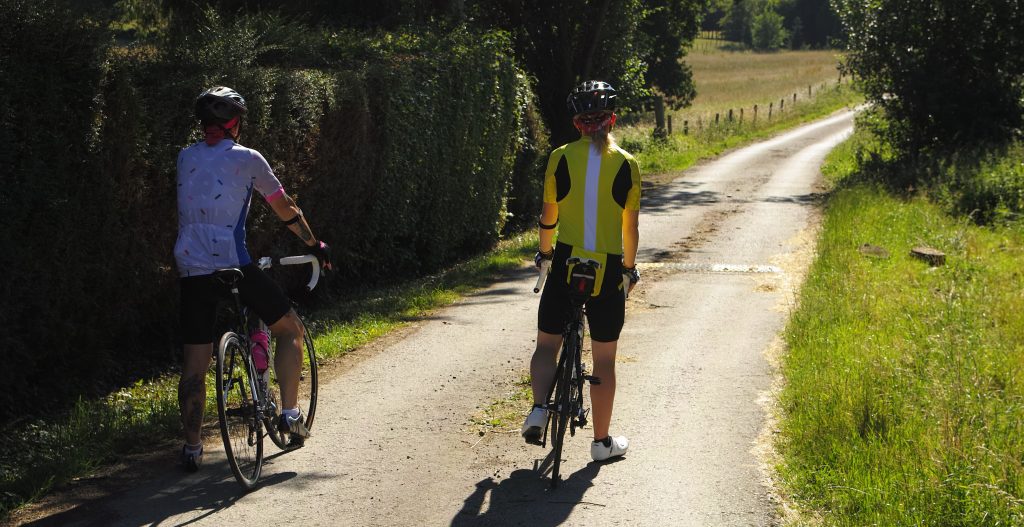
Further reading…


